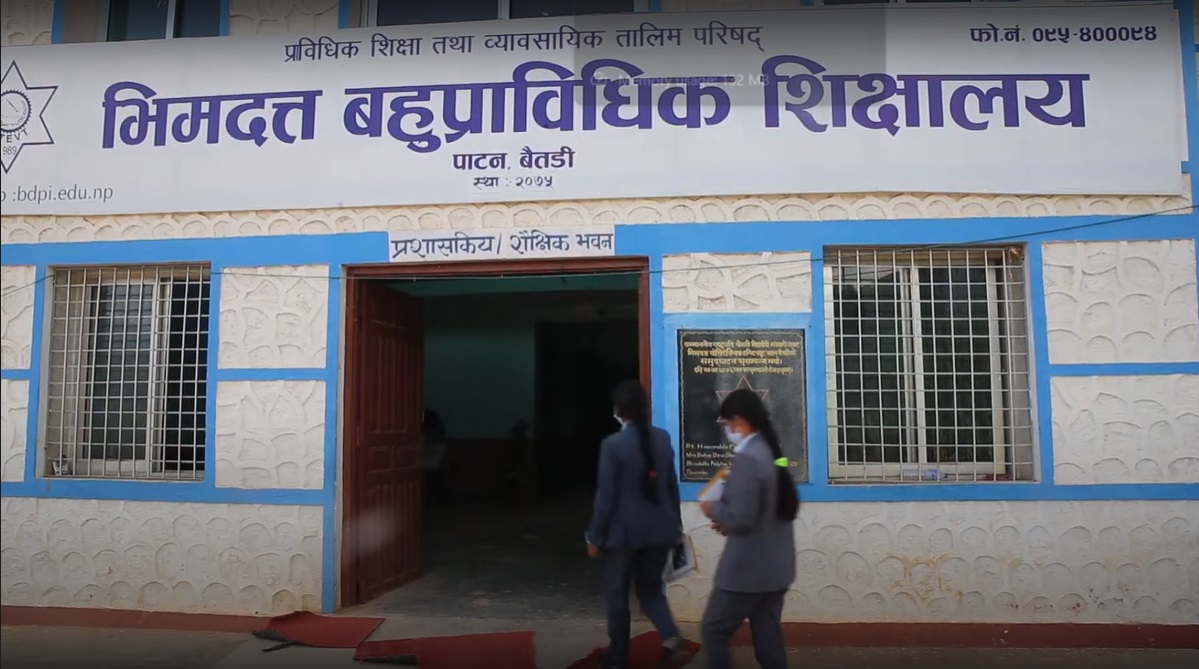Overview
Bhimdutta Polytechnic Institute (BDPI) is one of the constituent institutions under the Council for Technical Education and Vocational Training (CTEVT) in Nepal. Established in 2018 (2075 B.S.), it is in Patan Municipality–6 of Baitadi district in Sudurpashchim Province.
The institute was officially inaugurated on 27 February 2020 by the President of Nepal, Mrs. Bidhya Devi Bhandari. It occupies 55 Ropani of land allocated by the Government of Nepal and aims to increase access to technical education in the region.

Academic Affiliation and Focus Areas
Affiliated with CTEVT, BDPI provides long-term diploma programs in Civil Engineering, Agriculture (Plant Science), and Pharmacy. All programs follow the standard CTEVT curriculum and are structured to prepare students for technical roles across various sectors.
In addition to diploma programs, BDPI conducts short-term vocational training based on local employment needs, helping bridge the gap between education and the workforce.
Institutional Mission and Vision
Mission:
BDPI aims to prepare technically competent graduates through practical and skill-based education. It promotes intellectual development, creative thinking, and responsible citizenship in technical and vocational fields.
Vision:
To be a recognized institution for quality TVET education in Nepal by contributing to a skilled workforce that supports local and national development.
Core Objectives
-
Deliver accessible and skill-based education to meet workforce demands
-
Promote student engagement through practical learning experiences
-
Support graduates in becoming independent, confident, and employable professionals
-
Strengthen collaboration with local industries and employers
-
Contribute to the national goal of “Prosperous Nepal, Happy Nepali” through technical education
Programs Offered
Diploma in Agriculture (Plant Science)
-
Affiliation: CTEVT
-
Seats: 40 (4 scholarship seats)
-
Duration: 3 years
-
Eligibility: SEE (Class 10) passed with second division
-
Purpose: Prepares students to work in plant science, plant protection, agronomy, and sustainable agriculture practices.
Diploma in Civil Engineering
-
Affiliation: CTEVT
-
Seats: 48 (4 scholarship seats)
-
Duration: 3 years
-
Eligibility: SEE passed with Mathematics, Science, and English, or equivalent TSLC
-
Purpose: Equips students with skills for construction work, surveying, design assistance, and site supervision in engineering projects.
Diploma in Pharmacy
-
Affiliation: CTEVT
-
Seats: 40 (4 scholarship seats)
-
Duration: 3 years
-
Eligibility: SEE passed with Science and compulsory subjects
-
Purpose: Provides foundational training in dispensing, pharmaceutical preparation, and hospital or retail pharmacy services.
Learning Environment and Facilities
Academic Buildings and Laboratories
The campus includes eight buildings dedicated to labs and classrooms. Agriculture and Civil Engineering students can access subject-specific labs with basic practical tools.
Library and Reading Area
A separate library block exists within the campus. Although still in development, it serves as a resource area for reference books and study materials.
Canteen Facility
A dedicated canteen building is available to provide meals and refreshments to students and staff.
Staff Residences
Officers, teaching staff, and the principal have accommodation facilities on campus. These quarters contribute to a supportive academic environment.
Girls' Hostel (Planned)
The institute plans to construct a girls’ hostel to enhance residential safety and support female students from remote regions.
Admission Information
All diploma programs require candidates to pass the entrance exam conducted by CTEVT. Admission is based on merit, and the process is transparent and competitive.
General Admission Steps:
-
Collect the entrance form from the BDPI office or CTEVT’s website.
-
Submit the completed form along with academic documents and the prescribed fee.
-
Appear for the entrance examination.
-
Admission is granted based on ranking in the entrance results.
Scholarships are available to eligible students through CTEVT policies, covering marginalized, economically disadvantaged, and underrepresented groups.
Short-Term Skill Training
Beyond diploma-level courses, BDPI runs short-duration training focused on practical skills required by the local job market. These may include:
-
Vegetable farming and crop production
-
Masonry and small-scale construction
-
Plumbing and electrical maintenance
-
Basic livestock and poultry management
These courses help community members, including youth and returnee migrants, gain employable skills for income generation.
Learning Approach and Student Support
The teaching model at BDPI focuses on student-centered learning. Fieldwork, group activities, lab sessions, and technical workshops are integrated into the curriculum. The institute promotes:
-
Active participation in hands-on activities
-
Communication skills and workplace readiness
-
Team collaboration and task management
-
Regular evaluation through project-based assignments
Instructors bring subject expertise and field experience, helping students link theory with practice.
Regional Contribution and Impact
BDPI is vital in delivering technical education to students in Baitadi and neighboring districts. Offering skill-based training at the local level helps reduce outmigration and supports the growth of community-level entrepreneurship.
Many graduates are employed in agriculture, construction, and healthcare, contributing directly to their local economies.
Conclusion
Bhimdutta Polytechnic Institute is committed to delivering practical and meaningful technical education. Through its affiliation with CTEVT, it offers diploma programs in civil engineering, agriculture, and pharmacy aligned with national academic standards and regional workforce demands. With ongoing efforts to expand its facilities, develop residential options, and introduce new training programs, BDPI continues to serve as a valuable educational hub in Nepal’s far-western region.
















